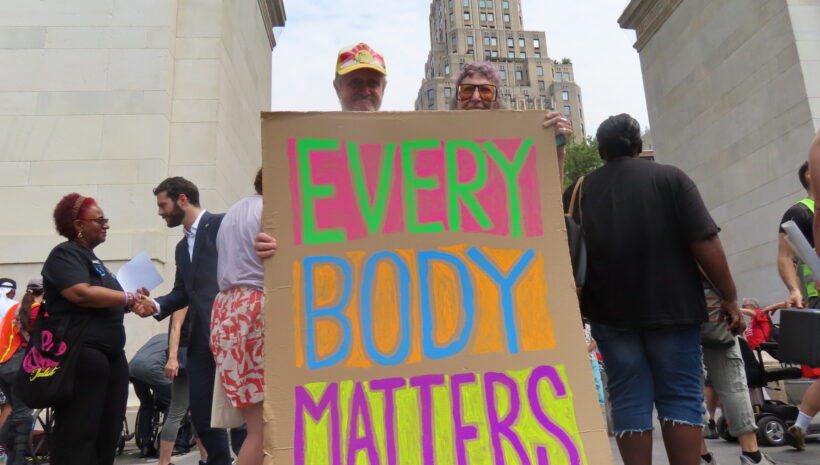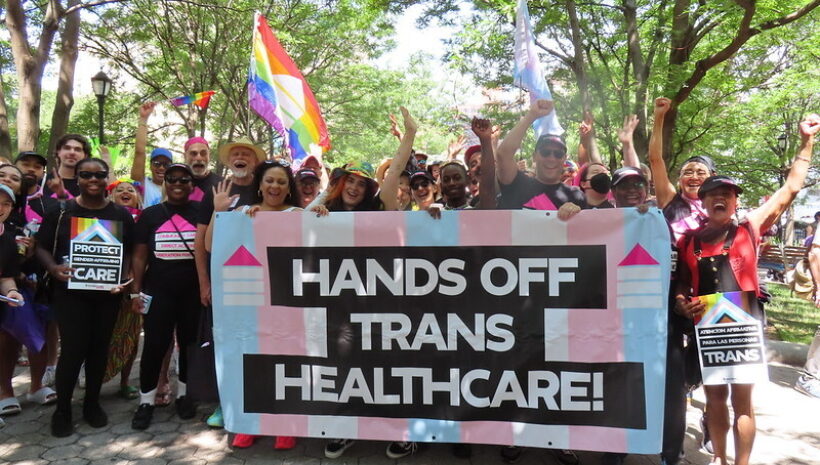On December 2, thirty-one AIDS agencies including Housing Works sent this letter to federal health honcho Kathleen Sebelius asking her to crack down on Obamacare (Affordable Care Act) plans throughout the country that are making things hard on HIV+ folks by not letting plan shoppers see their drug formularies, not covering preferred one-pill-daily HIV formulations or charging outrageous cost-sharing on HIV meds, such as 50 percent of the price of meds that cost thousands of dollars a month.
The letter also asks that the feds ensure that HIV patients are allowed to stay with their preexisting doctors. The letter reminds that such enforcement is in keeping with the ACA clause barring discrimination from plans based on preexisting or chronic conditions.
The news was reported yesterday by The Washington Post and by The Wall Street Journal. (Their story is blocked by a paywall, so we’ve copied and pasted it in below.)
Taking the lead on the effort is the website HIV Health Reform, out of the AIDS Foundation of Chicago, which tracks how Obamacare (the Affordable Care Act) is intersecting with and impacting existing HIV care programs in the U.S., such as Medicaid and ADAP.
According to John Peller, VP of policy for AIDS Foundation of Chicago, most of the complaints are coming out of states such as Florida, Georgia, Alabama and the Carolinas that don’t have their own state exchanges but are using the federal exchange (healthcare.gov). Peller said he had heard of no such complaints yet out of New York. Peller asks that you email him if you hear of such complaints anywhere so they can be compiled.
Some of the complaints the AIDS agencies compiled in their letter include:
>Coventry placing all of the HIV antiretrovirals on Tier 5 requiring a 40 percent coinsurance after a deductible (of at least $1,000) and often prior authorization (Reported for Florida, Illinois, North Carolina, and South Carolina
>BlueCross BlueShield of Georgia placing all of the HIV antiretrovirals on Tier 4 – the Specialty Tier with coinsurance up to 20 percent
>Cigna placing all of the HIV antiretrovirals on Tier 5 with an up to 40 percent coinsurance after a deductible up to $2,750 (reported for Florida and possibly other states
>Humana not posting its full HIV formulary online, suggesting to potential enrollees that they only cover six HIV antiretrovirals (reported for Florida, Alabama and other states) and in Florida placing all HIV drugs on a Tier 5 with a 50 percent coinsurance after a deductible
>Aetna placing the majority of HIV drugs on Tier 3, which requires a 50 percent coinsurance, after a prescription drug deductible (reported in Florida
>Chinese Community Health Plan in San Francisco placing all available HIV drugs on a specialty tier with no cost sharing information available and requiring that all drugs on the specialty tier be accessed only through a specialty pharmacy
If anything, these problems point up the continued importance of strong Ryan White CARE Act (ADAP) funding, as it appears that HIV+ folks in several states will, at least for now, continue to have a hard time paying for treatment and meds even when they are able to access an Obamacare plan. Also pointing up the continued importance of Ryan White money was a joint NYTimes/Texas Tribune story a few days ago showing how Texas’ decision (in line with 25 other states, most of them red) not to expand Medicaid is leaving many poor HIV+ people out in the cold even in the Obamacare era:
“But many H.I.V. patients in Texas live below the poverty line and are therefore ineligible for subsidies on the exchange. Add Texas’ decision not to expand Medicaid to cover poor adults, and the bulk of low-income H.I.V. patients are missing out on expanded health coverage.
Mr. and Ms. Hughes, who have four dependent children, recently started a home repair business and do not know how much they will earn next year.
The stakes are high. If their income is below $31,590 — the requirement for a family of six to receive tax subsidies on the federal exchange — they will rank among the thousands of H.I.V.-positive Texans whose incomes are too low for subsidized private insurance but too high for Medicaid. Roughly 14,000 Texans with H.I.V. used assistance from the Ryan White program to pay for antiretroviral medication in 2011, while nearly 19,000 were not receiving any H.I.V.-related medical care, according to the Department of State Health Services.”
Let’s hope Jon Stewart’s “Daily Show” isn’t the only place that continues to point out loudly how cruel it is to deny poor people fed-funded Medicaid just to spite Obama.
Here is the full WSJ story on the letter to Sebelius:
Group Says Plans Discourage HIV Patients
Some Drug Coverage Offered on Affordable Care Act’s New Exchanges Requires Steep Payments
• Melinda Beck
• Dec. 10, 2013 8:31 p.m. ET
A coalition of 31 HIV/AIDS organizations is urging the Obama administration to investigate whether some health insurers are trying to discourage HIV-infected patients from enrolling in new policies being sold under the health-care law, a move the groups say could be illegal.
The Affordable Care Act prohibits discrimination against people who are sick; insurers can’t deny them coverage or charge them more than healthier peers.
But in a letter to Secretary of Health and Human Services Kathleen Sebelius last week, the coalition said it had noticed “a number of disturbing trends” in plans on the insurance exchanges, including plans that don’t cover all available HIV drugs and what it termed “egregious cost-sharing designs.”
What constitutes discrimination under the health law isn’t clear, legal experts say, because the administration has yet to issue guidance.
Experts including the Center on Health Insurance Reforms at Georgetown University’s Health Policy Institute are studying the issue. “You are not supposed to design policies that discriminate, but what does it mean for a plan to be discriminatory? We don’t know that yet,” said Kevin Lucia, a research professor at the institute.
Among examples the HIV/AIDS coalition cited:
Aetna Inc. requires patients to pay 50% of the cost, after a drug deductible, for most HIV drugs in Florida. In Florida and some other states, Cigna Corp. and Aetna’s separate CoventryOne put all HIV drugs—including generics—in a special category, requiring patients to pay 40% to 50% of their cost. That can be thousands of dollars a month.
Humana Inc.‘s posted list of covered drugs in Florida and Alabama lists only six HIV drugs; other drugs are on a separate specialty list that shoppers might not know to check, the group says. All require patients to pay 50% of the cost, after a separate drug deductible.
For most drugs, insurers have traditionally required patients to pay only a flat copay, generally $10 to $50.
A spokesman for HHS said Tuesday, “We are looking into the issue of HIV drug coverage to see if further action is needed.” She added that “all marketplace plans are required to cover prescription drugs, allowing many consumers to be able to access the medicines they need for the first time.”
A spokeswoman for Cigna said it offered a variety of options that allow customers to pick a plan that best meets their needs. A spokesman for Aetna and Coventry said its plans provide access to HIV care that follow the latest HHS guidelines and evidence-based practices.
A spokesman for Humana said people researching plans on the exchanges should use the tools at humama.com for the most accurate information about particular drugs.
The HIV/AIDS groups haven’t received a response from their Dec. 2 letter, said Robert Greenwald, director of the Center for Health and Law Policy Innovation at Harvard University and co-chair of the coalition. “This matters a lot to people living with HIV,” he said.
Mr. Greenwald said that after discussions with his organization, some insurers had agreed to add coverage of new HIV drugs called single-tablet regimes, which combine several older drugs. “We’ve made some progress there,” he said. But he added, “We cannot view it as a sufficient step forward if the copayment is so high that the drug is all but inaccessible to many patients.”
Most HIV/AIDS organizations are very supportive of the new health law. Only about 17% of the estimated 1.1 million HIV-infected Americans are covered by private insurance, according to the AIDS Institute, and many will now qualify for private plans or Medicaid under its expansion. In many states, government programs also help HIV patients with out-of-pocket costs for drugs and premiums.
Even before the Affordable Care Act, insurers increasingly had been requiring patients to pay up to 50% of the costs of so-called specialty drugs, which typically are those that require special handling, need to be injected or infused and can costs thousands of dollars a month.
But some AIDS advocates say that some insurers seem to be singling out all HIV drugs, even generics, with high cost-sharing fees.
“Why is it every HIV drug, no matter how old it is, how costly it is, gets on the highest tier?” asked Carl Schmid, deputy director of the AIDS Institute in Washington.
He also noted that some insurers, including BlueCross BlueShield plans in many states, require relatively low, flat copays for HIV drugs. “Why can BlueCross BlueShield charge reasonable fees—but not Humana or Aetna?” Mr. Schmid said.
Robert Zirkelbach, a spokesman for America’s Health Insurance Plans, an industry group, said the health law spreads the risks, requiring plans that attract a disproportionate share of healthy enrollees to help pay for those plans with sicker, costlier patients. Health plans, he said, “are doing everything they can to keep coverage as affordable as possible.”
Drug Coverage
Some insurers offer much more generous coverage of HIV drugs than others in plans offered under the Affordable Care Act.
How ‘silver-level’ plans in Miami-Dade County, Fla., compare for 28 standard HIV drugs and three newer single-tablet regimes (STRs), which combine several older medications.
Carrier (number of plans)
HIV drugs covered
Typical monthly costs to patients
Aetna (2)
27; no STRs*
generics $10-$30; others 50%
Ambetter (12)
27; two STRs
generics $10-$60; others $5-to $150 after drug deductible
Florida Blue (23)
27; three STRs
generics $10-$50; others $40-$75
Cigna (5)
27; two STRS
all HIV drugs 40%-50% after deductible in most plans
CoventryOne* (1)
27; three STRs
all HIV drugs 40%, in network only; plus deductible
Humana (2)
28; three STRS**
all HIV drugs 50%; 40% if purchased at specialty pharmacy
Molina Healthcare (1)
27; three STRS
all HIV drugs $8-$55 in network only
*Aetna says it will add all three in 2014
**Humana’s posted formulary lists only six; others are listed separately elsewhere
Source: AIDS Institute




